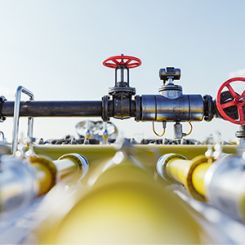
Last week, Exxon announced it would cut the number of oil rigs operating in the Permian Basin as energy demands plunge following the spread of the coronavirus, according to a report from ABCNews.
And Exxon is not the only company making adjustments as COVID-19—and fear of its spread—reaches more people.
The United States Energy Information Administration (EIA) has estimated that COVID-19 will reduce China’s total petroleum and liquid fuels demand by approximately 190,000 barrels per day in 2020, according to a report from investment bank Jordan Knauff & Company, which provides merger and acquisitions advisory services to the pump, valve and filtration industries.
Harvard Business Review has released predictions that global supply chains will be impacted by mid-March, “forcing thousands of companies to throttle down or temporarily shut assembly and manufacturing plants in the U.S. and Europe.”
In fact, according to Jordan Knauff, South Korea, Japan and Italy have closed factories as confirmed coronavirus cases are on the rise there.
While some analyses are comparing the COVID-19 outbreak to SARS during 2002-2003, Harvard Business Review says this is not a good comparison because China’s importance in the worldwide economy has increased in the last 18 years. During 2003, the gross domestic product (GDP) of China was 4.31 percent of the world GDP; today, China represents 16 percent of the world GDP.
The global liquid fuels demand is now 378,000 barrels per day less than was forecast in January, Jordan Knauff reported. The difference is driven by lower-than-expected heating fuel consumption caused by a warmer winter, an expected slowing of economic growth in general, and the economic effects of the COVID-19 outbreak.
Effects on the Pumps Industry
“Companies are formulating travel protocol on a daily basis,” John Malinowski, a Pumps & Systems Editorial Advisory Board member and industrial motor consultant, said last week. “It is clear that most are restricting international travel, particularly to hot spots of mass infection. But how do we know where that really is as the virus spreads? Some companies are restricting all travel.
“I expect trade show attendance may suffer,” Malinowski said. “Perhaps they should be canceled or postponed. Conferences should do the same or at least be prepared to offer web-based attendance for those who choose not to attend in person.”
Indeed, the Asia Turbomachinery & Pump Symposium scheduled for Kuala Lumpur, Malaysia, April 6-9, has been postponed.
“Due to travel restrictions and restraints at gathering at large public national and international events, there are certain high-profile market sectors that are going to be impacted temporarily by the COVID-19 outbreak,” said Chris Wilder, Pumps & Systems Editorial Advisory Board member and CEO of Sealing Equipment Products Co., Inc. (SEPCO). “Our hope at SEPCO is that the impact doesn’t lead to unfounded economic impact to other markets due to purely reactionary measures.
“But the threat and the severity of impact to the health and wellbeing of those on the front lines of care or with compromised immunity is real and needs to be addressed in collaboration by the globes best experts.”
Future Predictions
Jordan Knauff reports that economic growth in China will bounce back once the effects of COVID-19 have faded. By the end of this year, the EIA expects petroleum demand to get closer to the levels forecast in January.
On Wall Street, the Dow Jones Industrial Average lost 10 percent, the S&P 500 Index fell 8.4 percent, while the NASDAQ Composite slipped 6.4 percent for the month of February. The coronavirus pushed investors into defensive stocks and safe haven assets like treasury bonds and gold, according to Jordan Knauff. Growth and corporate earnings projections from several companies have been reduced due to the virus.

